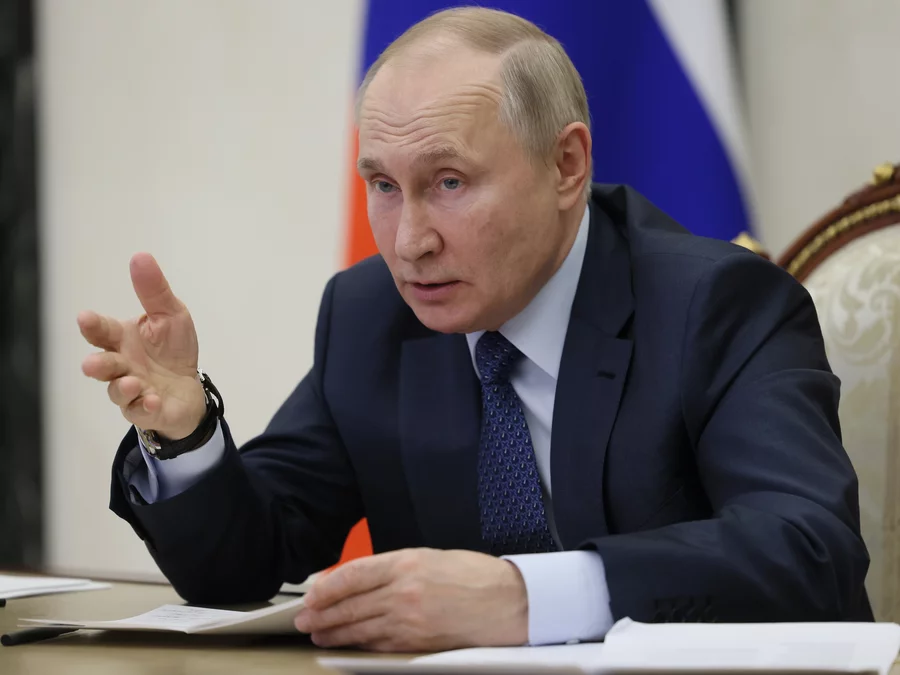
By Ray McGovern, October 17, 2023
Russian President Vladimir Putin ad-libbed answers in an interesting interview with Chinese state media before departing for Beijing yesterday. Media consumers should be permitted to learn what Putin said – particularly about Ukraine and Russia’s problems dealing with various US administrations over the years. Readers who rely on the “paper of record”, however, will be shielded from Putin’s remarks and thus any temptation to ask if they might be true.
Today’s New York Times boiled the interview down to one sentence in a boilerplate piece titled: Putin Visits China to Bolster Ties With ‘My Friend,’ Xi:
“’Chairman Xi Jinping calls me his friend, and I call him my friend,’ Mr. Putin told Chinese state media ahead of his Beijing visit.”
Note to Readers: if you “know” that Putin always lies, please read no further. Those of more curious mind are invited to read on. The following are direct quotes from Putin’s responses to questions from the Chinese interviewer, fact checked by me:
++++++++++++++++++++++++++
I would like to remind you that hostilities in Ukraine did not start with our special military operation, but way before – in 2014, when the Western countries, after having volunteered as guarantors of the agreements between President Yanukovich and the opposition, forgot about those guarantees in a matter of days and – worse still – supported a coup d’état. United States Administration officials even acknowledged spending big money on it – five billion, they said, if memory serves me, – and now we have what was bound to happen. [CORRECT]
I am not going to dwell on whether it was a revolution or whether it was a color revolution, but it was anyway a coup d’état. Yes, it had to do with mistakes made by the then leadership, but those mistakes needed to be remedied through democratic procedures, rather than by means of militants in the streets. But Western countries chose otherwise – to support a coup d’état. [CORRECT]
And then, essentially by proxy of the Kiev regime, they started hostilities in the south-east of Ukraine, in Donbass, and continued those hostilities for eight years, killing women and children. The West paid no attention to that or pretended not to notice. [CORRECT]
Even when agreements were signed in Minsk, Belarus, known as the Minsk Agreements, Russia did everything to follow this path towards settling the conflict. They did not let us do that, either. Moreover, Ukraine’s leaders ultimately said that they simply did not like those Minsk Agreements and they were not going to fulfil them. [CORRECT]
This was aggravated by the United States’ attempts to drag Ukraine into NATO, which led to the escalation of the conflict. Let me remind you that, when Ukraine gained independence – or proclaimed its independence – it was the Declaration of Independence that served as the fundamental document laying the basis for Ukrainian independence. The main principle enshrined in this Declaration of Independence was that Ukraine is a neutral state. [CORRECT]
Yet in 2008, for no good reason – there was no crisis in sight – they announced that they would welcome Ukraine in NATO. [CORRECT]
Why? Still no one understands. And thus, year by year, they would heighten the tensions. Then, finally, the 2014 crisis hit, the hostilities broke out. This took the escalation to a new level. [CORRECT]
Therefore, the start of the special military operation was not the start of a war, but an attempt to end it. … [CORRECT]
We reached an agreement in Istanbul confirming that we were ready for this [to end the special military operation], provided that – I emphasize – the legitimate security interests of Russia are respected. The Ukrainian side put forward very strict demands in terms of security, and we almost accepted them. [CORRECT]
However, as soon as we pulled our troops back from the Ukrainian capital, Kiev, the Ukrainian side committed all the arrangements to flames. … They announced that they would seek to defeat Russia and secure a victory on the battlefield, to inflict a strategic defeat on Russia. They launched an active military operation, the so-called counter-offensive. It has continued since 4 June. No results achieved so far, only massive losses. The losses are simply huge, at a ratio of one to eight. [CORRECT]
Of course, we know the proposals of our Chinese friends. We highly value those proposals. I think they are absolutely realistic and could lay the foundation for peace arrangements. But, unfortunately, the opposing side does not want to enter into any negotiations. In fact, the President of Ukraine has even issued a decree prohibiting everyone – including himself – to conduct any negotiations with us. How can we conduct negotiations if they are not willing to and even issued a regulation prohibiting such negotiations? [CORRECT] …
The security of one group of states cannot be built at the expense of security of other states. Security needs to be the same for everyone. In this context, it is extremely important for us that Ukraine stays outside any blocs. We were told as far back as 1991 – by the then US Administration – that NATO would not expand further east. [CORRECT; but one year off re US promises, which began in Feb. 1990]
Since then, there have been five waves of NATO expansion, and every time we expressed our concerns. Every time we were told: yes, we promised you not to expand NATO eastwards, but those were verbal promises – is there any paper with our signature on it? No paper? Good-bye. [CORRECT]
You see, it is very difficult to engage in a dialogue with people like that. I have already cited the example of the Iranian nuclear program. The negotiations on the Iranian nuclear program were very, very lengthy. An agreement was reached, a compromise found, and documents signed. Then came a new Administration and threw everything in the trash, as if those arrangements never existed. [CORRECT]
